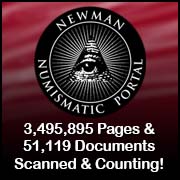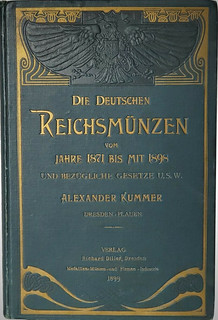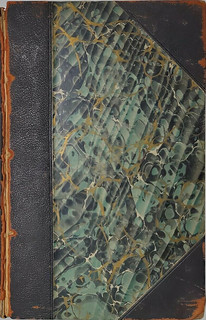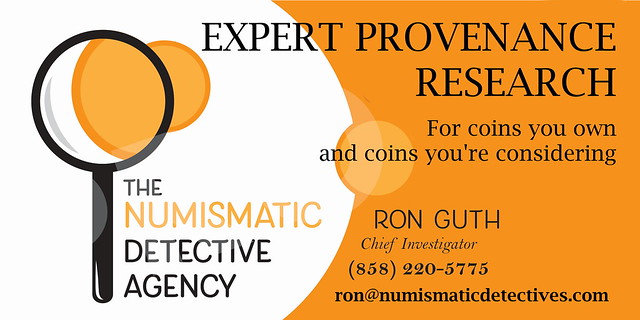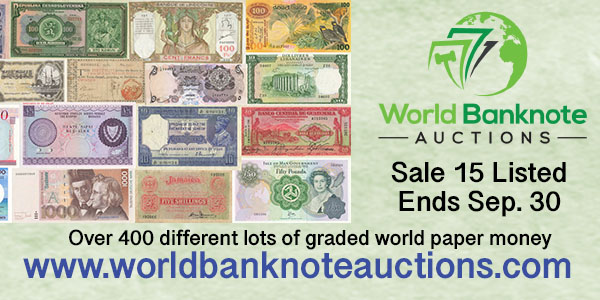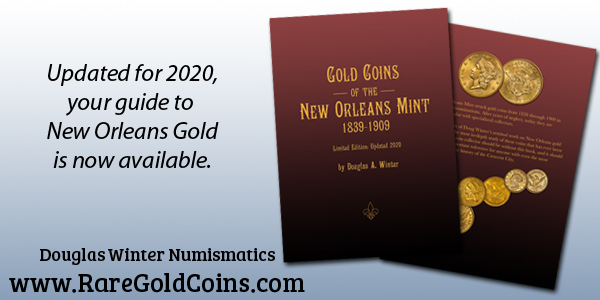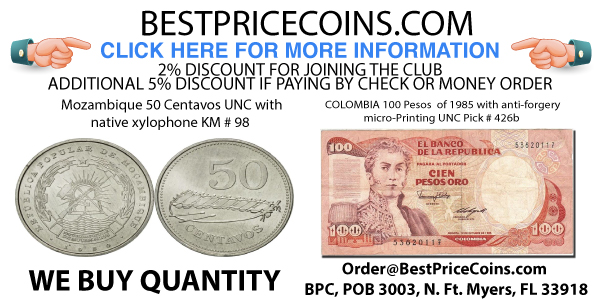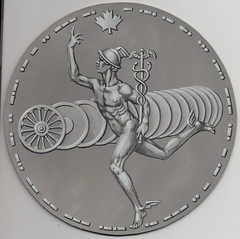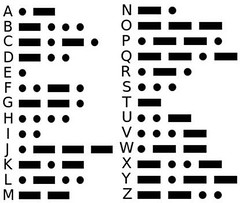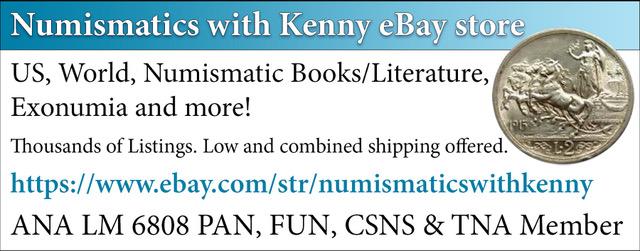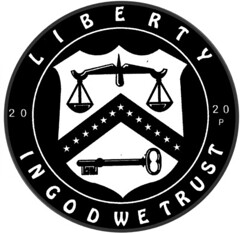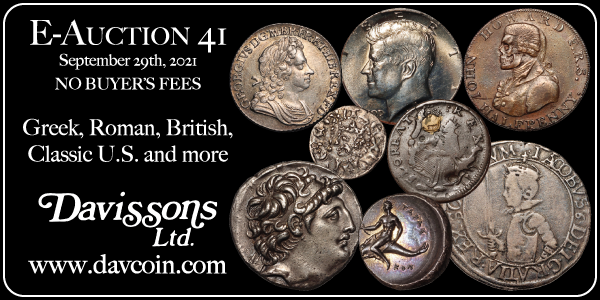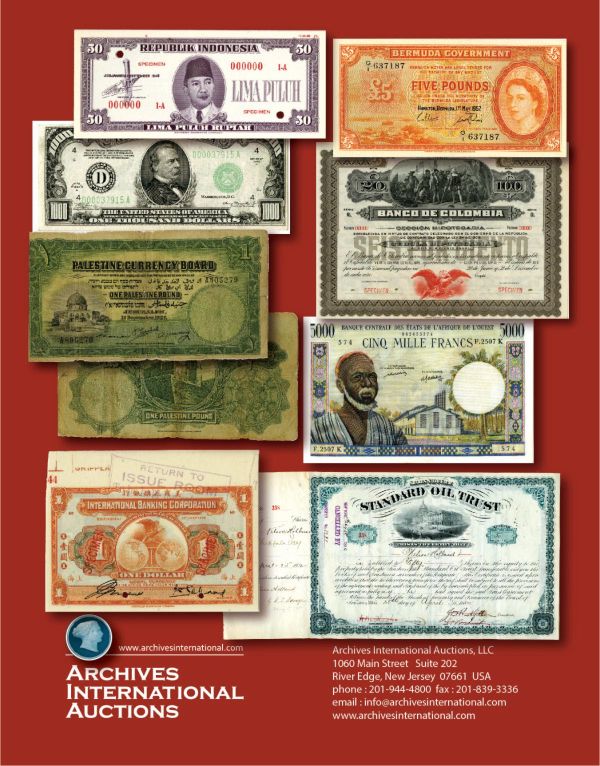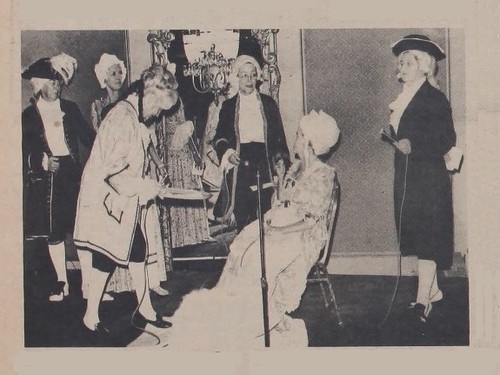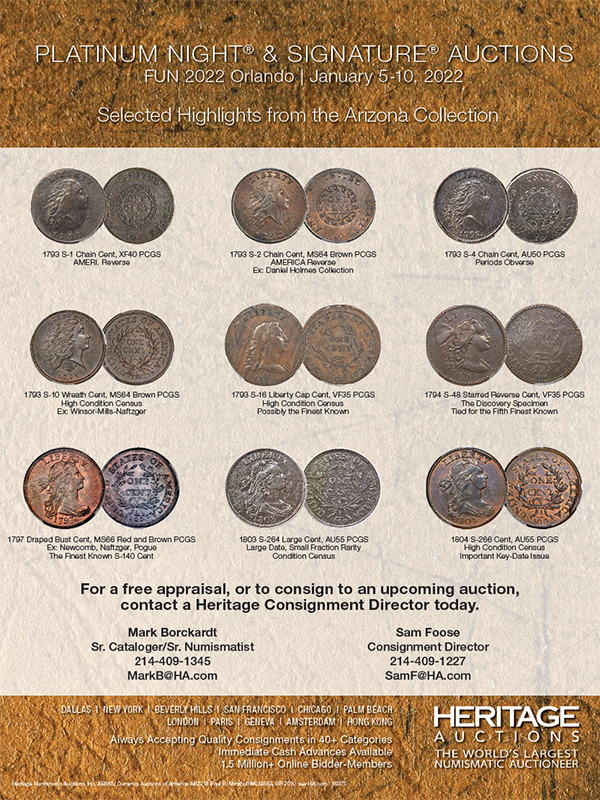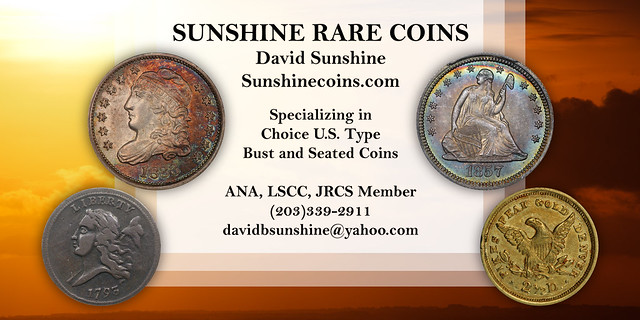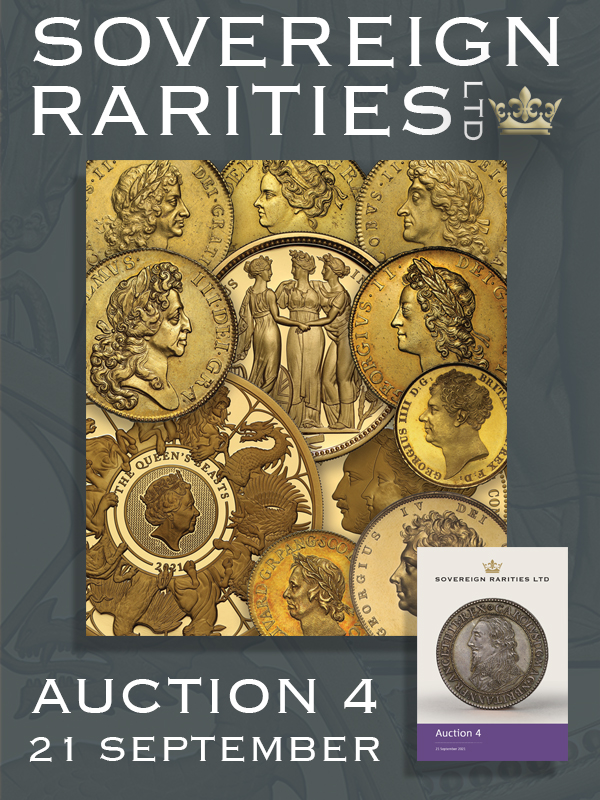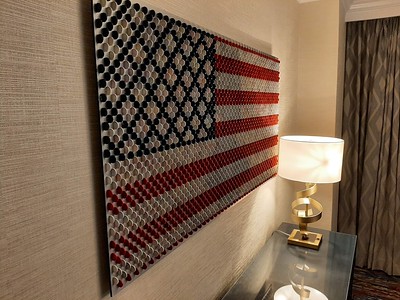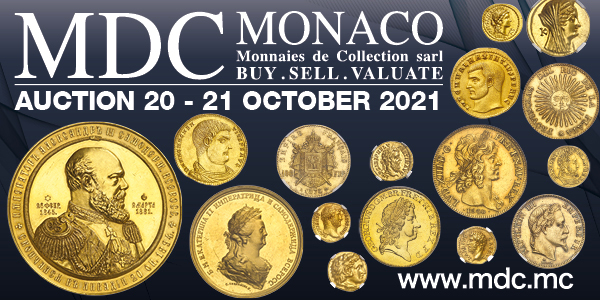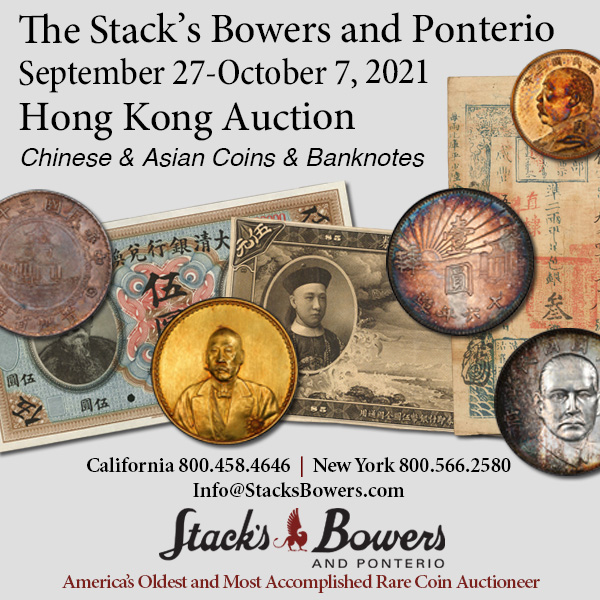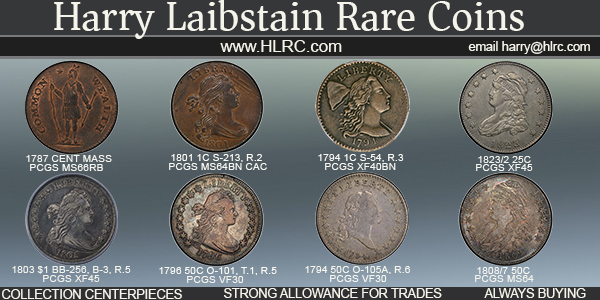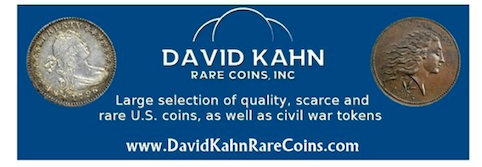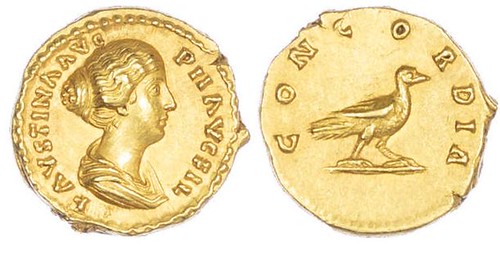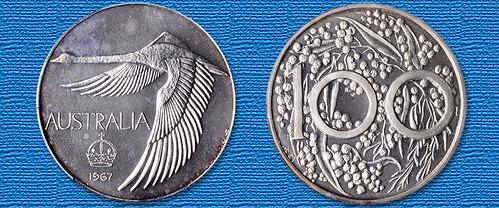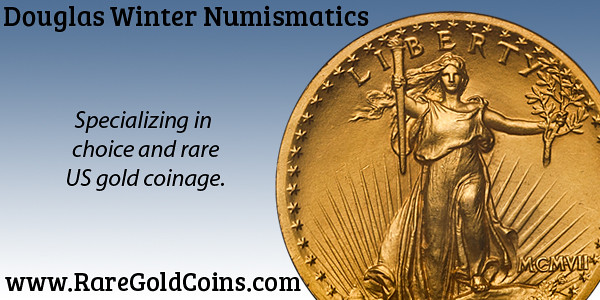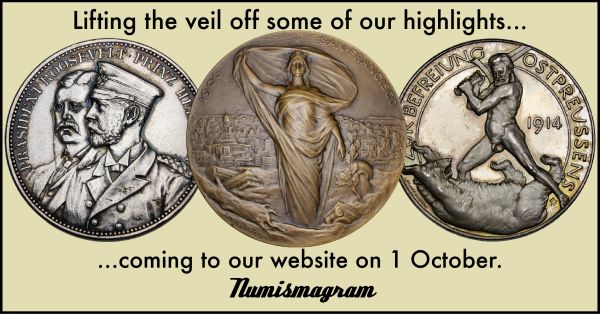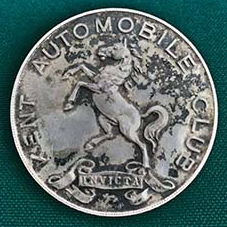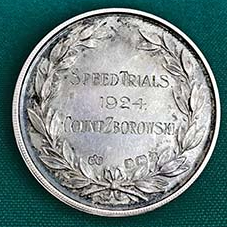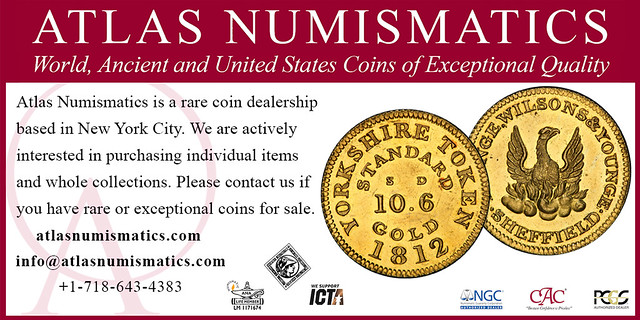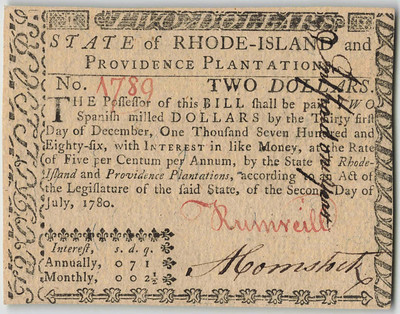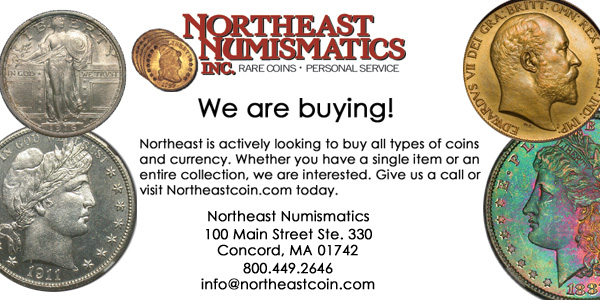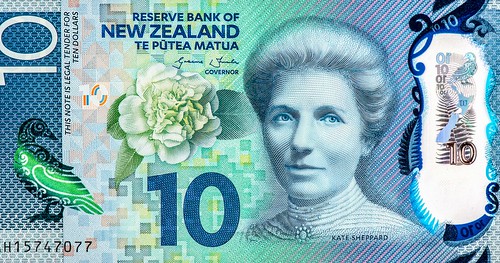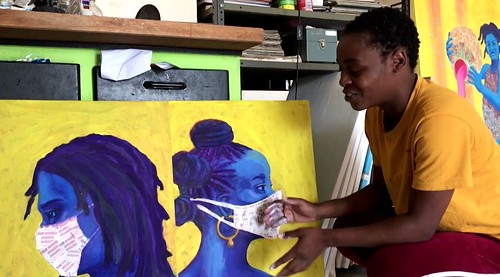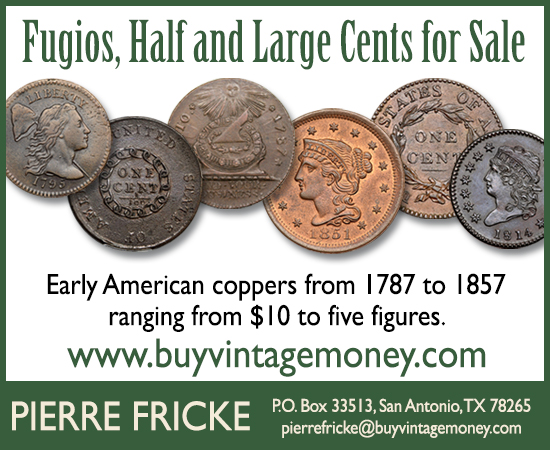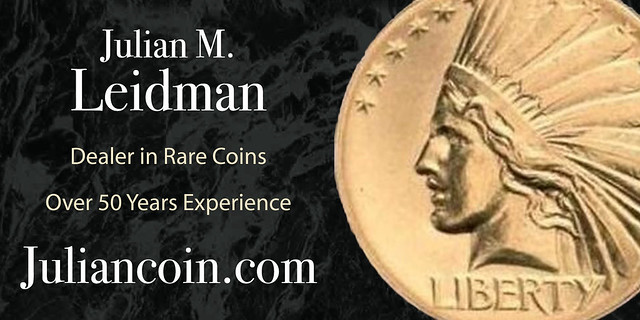
Visit our NBS Sponsors


About UsThe Numismatic Bibliomania Society is a non-profit association devoted to the study and enjoyment of numismatic literature. For more information please see our web site at coinbooks.org SubscriptionsThose wishing to become new E-Sylum subscribers (or wishing to Unsubscribe) can go to the following web page link MembershipThere is a membership application available on the web site Membership Application To join, print the application and return it with your check to the address printed on the application. Print/Digital membership is $40 to addresses in the U.S., and $60 elsewhere. A digital-only membership is available for $25. For those without web access, write to: Charles Heck, Treasurer AsylumFor Asylum mailing address changes and other membership questions, contact Chuck at this email address: treasurer@coinbooks.org SubmissionsTo submit items for publication in The E-Sylum, write to the Editor at this address: whomren@gmail.com BUY THE BOOK BEFORE THE COIN |
- WAYNE'S WORDS: THE E-SYLUM SEPTEMBER 19, 2021
- ANS OFFERS NUMISMATIC LITERATURE
- IAPN BOOK PRIZE 2020
- FRED L. REED III (1948-2021)
- NEWMAN EDITING MONEY IN EARLY AMERICA
- VIDEO: MEXICAN COPPER COIN BOOKS
- QUERY: MORSE CODE ON 2004 OLYMPIC COIN DESIGN
- COIN FOUND IN THE BELLY OF A COD FISH
- NEW YORK NUMISMATICS ON 9/11: STACKS
- NOTES FROM E-SYLUM READERS: SEPTEMBER 19, 2021
- BITCOIN TRADING AND STAMP COLLECTING
- "FOREVER COIN" IDEA
- VOCABULARY TERM: FIREGILDING, FIREGILT
- RITTENHOUSE HALF DISMES REENACTMENT ANSWER
- FORGOTTEN COIN BOARDS
- JOEL OROSZ 2021 BURNETT ANDERSON AWARD
- WAYNE'S NUMISMATIC DIARY: SEPTEMBER 19, 2021
- GEOFFREY BELL 2021 FALL SALE HIGHLIGHTS
- HIGHLIGHTS OF THE AXEL TESMER COLLECTION
- KüNKER OFFERS 1870 JAPAN 20 YEN
- NUMISMATIC NUGGETS: SEPTEMBER 19, 2021
- 1967 AUSTRALIA PATTERN DOLLAR
- ROYAL MINT RESUMES PENNY PRODUCTION
- CHITTY BANG BANG MEDAL
- US COLONIAL PAPER MONEY: AN INTRODUCTION
- NEW ZEALAND FEMINIST KATE SHEPPARD
- BOGGS, TUBMAN AND U.S. PAPER MONEY
- ZIMBABWE ARTIST TURNS NOTES INTO PAINTINGS
- WHEN THE WILD BUNCH FIRST GRABBED GOLD
Click here to read the thin version on the web
Click here to subscribe
Click here to access the complete archive
To comment or submit articles, reply to whomren@gmail.com
Content presented in The E-Sylum is not necessarily researched or independently fact-checked, and views expressed do not necessarily represent those of the Numismatic Bibliomania Society.
WAYNE'S WORDS: THE E-SYLUM SEPTEMBER 19, 2021
 New subscribers this week include:
Dr John Rainey, OBE, courtesy Peter Preston-Morley;
Michael E. Kenny, courtesy Ronan Fitzpatrick;
Eric Bradley, and
Inja MacClure.
Welcome aboard! We now have 6,706 subscribers.
New subscribers this week include:
Dr John Rainey, OBE, courtesy Peter Preston-Morley;
Michael E. Kenny, courtesy Ronan Fitzpatrick;
Eric Bradley, and
Inja MacClure.
Welcome aboard! We now have 6,706 subscribers.
Thank you for reading The E-Sylum. If you enjoy it, please send me the email addresses of friends you think may enjoy it as well and I'll send them a subscription. Contact me at whomren@gmail.com anytime regarding your subscription, or questions, comments or suggestions about our content.
This week we open with numismatic literature offerings from ANS, book awards from IAPN, updates from the Newman Numismatic Portal, and more.
Other topics this week include a "Forever Coin", firegilding, the Burnett Anderson Memorial Award, auction previews, the 1967 Australian pattern dollar, U.S. colonial paper money, J.S.G. Boggs and Harriet Tubman, and Butch Cassidy and the Sundance Kid.
To learn more about Confederate Treasury Notes, Swedish gold coins, Fred Reed, Dick Doty, Eric Newman, Ed Cogan, New York numismatics on 9/11, the Rittenhouse half dismes reenactment, two-faced Lincoln cent art, Where's George, a new coin for Japan, Swindleville Avenue, the Chitty Bang Bang medal, and the coin found in the belly of a codfish, read on. Have a great week, everyone!
Wayne Homren
Editor, The E-Sylum
ANS OFFERS NUMISMATIC LITERATURE
Don't forget that the American Numismatic Society has an ongoing sale of duplicates on eBay, and numismatic literature is included along with some great coins, tokens and medals. Here's a selection of some current book offerings. -Editor
IAPN BOOK PRIZE 2020
International Association of Professional Numismatists (IAPN) Publication Committee chairman Peter Preston-Morley submitted the following report on the 2020 IAPN Book Prize. Thank you, and congratulations to the winners and nominees. -Editor
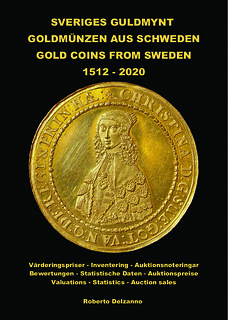 I am writing with news of the IAPN Book Prize for 2020, which was competed for last weekend at the organisation's much-delayed 2021 General Assembly, which was staged online via Zoom. The original contest was scheduled to have been held live, in Marseilles, in May 2020, but for obvious reasons associated with the pandemic had to be postponed.
I am writing with news of the IAPN Book Prize for 2020, which was competed for last weekend at the organisation's much-delayed 2021 General Assembly, which was staged online via Zoom. The original contest was scheduled to have been held live, in Marseilles, in May 2020, but for obvious reasons associated with the pandemic had to be postponed.
There were 16 nominations, as listed in the attachment. Of necessity, all books eligible had to have been published in 2019.
The clear winner was the Stockholm numismatist Roberto Delzanno, for his self-published 450-page catalogue, Sveriges Guldmynt 1512-2020. Placed second in the voting was the 200-page title by François Joyaux, Monnaies Impériales d'Annam, published by Editions V. Gadoury in Monaco. Third was the groundbreaking 2-volume study by British scholar Hodge Malek, entitled Arab-Sasanian Numismatic History during the Early Islamic Period in Iran and Iraq, published by the Royal Numismatic Society in London.
The prize, Swiss Fr 1,000, and a diploma, will be awarded to Mr Delzanno at a future date.
FRED L. REED III (1948-2021)
I was very sorry to learn recently that numismatic researcher and author Fred Reed has passed. Thanks to Benny Bolin, Cole Hendrickson and others who passed the word. Here's an article Benny provided from the current issue of Paper Money, the official publication of the Society of Paper Money Collectors. -Editor
Fred Reed passed away on Saturday, July 24
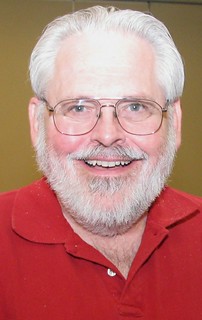 Fred L. Reed III was Honorary Life Member #24. An author, researcher, editor, Fred was indeed a stalwart in our hobby. He was born in Syracuse, NY and attended Oklahoma State University. He joined the Coin World staff in 1975 until he left in 1981. He took over and revitalized the SPMC's Paper Money as editor from 1999 to 2013. He also was editor of the TAMS journal. Besides serving as Editor Extraordinaire, he also served the society as Secretary, and served on the board of governors from 1998-2001. The society awarded him an Award of Merit in 2000 and the Nathan Gold award in 1996. He was named to the SPMC Hall of Fame in 2015. His career spanned many genres.
Fred L. Reed III was Honorary Life Member #24. An author, researcher, editor, Fred was indeed a stalwart in our hobby. He was born in Syracuse, NY and attended Oklahoma State University. He joined the Coin World staff in 1975 until he left in 1981. He took over and revitalized the SPMC's Paper Money as editor from 1999 to 2013. He also was editor of the TAMS journal. Besides serving as Editor Extraordinaire, he also served the society as Secretary, and served on the board of governors from 1998-2001. The society awarded him an Award of Merit in 2000 and the Nathan Gold award in 1996. He was named to the SPMC Hall of Fame in 2015. His career spanned many genres.
He was the writer/editor in the baseball card field and served as VP with Beckett Publications. His books included Civil War Encased Stamps: The Issuers and Their Times published in 1995 as well as a book on a related topic, Civil War Stamp Envelopes: Their Issuers and Their Times. With many irons in the fire, Fred was an avid researcher on Abraham Lincoln culminating with his book Abraham Lincoln: The Image of His Greatness published in 2009 followed by Abraham Lincoln: Beyond the American Icon published in 2013. He authored Show Me the Money: The Standard Catalog of Motion Picture, TV, Stage, and Advertising Prop Money published in 2005. He was the author of a
Numis-mystery
series from 1976-1977, and The Week that Was and Spare Change columns in Coin World. A very prolific writer, Fred contributed many articles to Bank Note Reporter, Coin World and Numismatic News to name a few publications.
NEWMAN EDITING MONEY IN EARLY AMERICA
Newman Numismatic Portal Project Coordinator Len Augsburger provided the following story of scholar Eric Newman's work ethic. Thanks. -Editor
Dick Doty and Eric Newman Dress Down for Numismatic Research
The renewal of the ANS Coinage of Americas Conference, with this week's conference focusing on Victor D. Brenner, brings to mind the forerunner of the COAC series, the 1976 volume Studies on Money in Early America. This work, edited by Richard Doty and Eric Newman, gathered scholarly papers on American numismatics. At an ANS tribute dinner held for Newman in 1996, Doty contributed the following anecdote surrounding production of the 1976 volume:
VIDEO: MEXICAN COPPER COIN BOOKS
These are selections from the David Lisot Video Library that feature news and personalities from the world of coin collecting. David has been attending coin conventions since 1972 and began videotaping in 1985. The Newman Numismatic Portal now lists all David's videos on their website at:
https://nnp.wustl.edu/library/multimediadetail/522852
Here's one on new Mexican Copper coin books at the 2021 Texas Numismatic Association Convention. See last week's articles for additional information. -Editor
QUERY: MORSE CODE ON 2004 OLYMPIC COIN DESIGN
John Regitko of Toronto submitted this question about a rejected Canadian coin design for a 2004 Olympic Games commemorative. -Editor
Regarding the differences in the Morse Code/International Code variables, I wonder if Peter Jones can advise me on the following:
My upcoming new book tentatively entitled "In Search of a Design" will show a number of rejected designs of themes that were selected for Canadian commemorative coins, as well as illustrations of designs of themes that were also under consideration but ultimately rejected.
COIN FOUND IN THE BELLY OF A COD FISH
Gary Oddie writes:
"Following recent notes in The E-Sylum, I have just put together a short note for the British Numismatic Society blog about a shilling found in the stomach of a cod fish in 1773."
Cool - thanks. Here's an excerpt, but see the complete article online for more. -Editor
Recently two notes have appeared on the E-Sylum about coins that have been found in the stomachs of fish. The first referred to an English seventeenth century token found in the stomach of a five-foot shark caught off Galveston, Texas in 1931.(1-4) The token was a farthing issued by Richard Langley of Ramsgate, dated 1657.
NEW YORK NUMISMATICS ON 9/11: STACKS
Harvey Stack submitted these remembrances of September 11 and its effect on their New York-based numismatic business. Thanks! -Editor
A "9 - 11" NUMISMATIC STORY FEW KNOW ABOUT
 Stack's planned in 2001 to have an important public
Auction sale in September, to be held on September 12, 13 in New York. The
coins were to be consigned by our close friend and collector, and important teacher,
Cornelius Vermule, who was the numismatic director of the Boston Museum of Fine Arts and
the Massachusetts Historical Society, who collected and taught Greek and Roman history,
and also had a great interest in the coinage of the Far East. His collection was one of the
most worthy in the various fields he amassed.
Stack's planned in 2001 to have an important public
Auction sale in September, to be held on September 12, 13 in New York. The
coins were to be consigned by our close friend and collector, and important teacher,
Cornelius Vermule, who was the numismatic director of the Boston Museum of Fine Arts and
the Massachusetts Historical Society, who collected and taught Greek and Roman history,
and also had a great interest in the coinage of the Far East. His collection was one of the
most worthy in the various fields he amassed.
Since the Stack family, all of us, were very close friends of "Bucky" (his nick-name given to him by his very close friends and colleagues), we felt it would be appropriate to offer his collection in our early fall sale. September was selected, as it would be close to the Summer ANA convention, and many of our overseas clients would still be traveling about the United States and would schedule to examine the collection, plan to attend and/or leave bids. The dates of the sale were to be after Labor Day that year, and we selected the sale dates of September 12, 13. A super illustrated catalog was prepared and we planned a long pre-sale exhibition time to gather the best audience we could.
THE BOOK BAZARRE
NOTES FROM E-SYLUM READERS: SEPTEMBER 19, 2021
Sidey,
not
Lidey
Mike Nixon of
Pearland, TX writes:
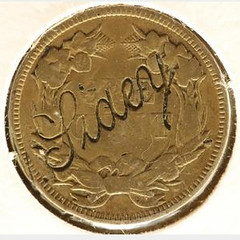 "I saw the bit on the counterstamped 1857 Flying Eagle in the most recent E-Sylum. Just so happens my collecting specialty is
"I saw the bit on the counterstamped 1857 Flying Eagle in the most recent E-Sylum. Just so happens my collecting specialty is
Flyers,
including a number of counterstamped examples I've picked up over the past few years, they're fascinating and hard to find like you mentioned. Had never heard of the auction company, but signed up and bid on the coin and won it for $118, about mid-range for what I've paid for others.
It's definitely
Sidey,
not
Lidey,
but the stamp is not listed in either Brunk's
Merchant and Privately Countermarked Coins
(2003) or Rulau's
U.S. Merchant Tokens 1845-1860
(1982), nor have I found any other information with internet searches.
Just another benefit of subscribing to The E-Sylum! "
Glad to help. It's not the first time someone has reported purchasing an item featured in The E-Sylum. I know many specialist chat boards have a taboo on mentioning for-sale items, so as not to spoil potential cherry-picks. Not here. Anything available for public sale is fair game for discussion, from major auction house lots to obscure eBay offerings. I find them the same way everyone can now, from free seller email newsletters to saved Internet searches. -Editor
To read the earlier E-Sylum article, see:
NUMISMATIC NUGGETS: SEPTEMBER 12, 2021 : Flying Eagle Cent Counterstamp / Love Token
(https://www.coinbooks.org/v24/esylum_v24n37a26.html)
Other topics this week include a "Cheaters Weight", and an Ed Cogan token. -Editor
BITCOIN TRADING AND STAMP COLLECTING
Carol Bastable passed along this item about Bitcoin from a September 13, 2021 Investing Daily email. -Editor
Crypto Trading Akin to Stamp Collecting
Finally, El Salvador may have embraced Bitcoin (BTC) as a national currency, but across the Atlantic, cooler heads prevail.
In fact, cryptocurrencies across the board took a header on Friday after the governor of Sweden's central bank pointed out Bitcoin's actual worthlessness.
"Private money usually collapses sooner or later," Riksbank Governor Stefan Ingves said. "And sure, you can get rich by trading in Bitcoin, but it's comparable to trading in stamps."
"FOREVER COIN" IDEA
Wayne Pearson passed along an unusual coinage concept. -Editor
Here is an idea for a forever coin, which marries the sister hobbies of coin and stamp collecting. Carrying all of the required coin writing, the obverse is representative of the United States Mint while the reverse is representative of the Postal System. Like a Trade Dollar, it carries no numerical domination, the value is FOREVER, based on the first class rate.
VOCABULARY TERM: FIREGILDING, FIREGILT
Here's another entry from Dick Johnson's Encyclopedia of Coin and Medal Terminology. -Editor
Firegilding, Firegilt. An early form of goldplating where a mixture of gold and mercury is applied to the surface to be plated, then the object is heated to drive off the mercury. Firesilvering can be done in a similar manner as well. However, the mercury fumes given off during the heating process were so injurious to the workers the process was abandoned – even prohibited in many countries, including France where it was widely practiced. The process, developed in antiquity, was completely replaced by electroplating in the middle of the 19th century.
Medals, as well as many metal objects, were gilded by such a method beginning in the Renaissance and continuing for over 400 years. Also a form of firegilding was practiced in the orient, and some 400 year-old Japanese firegilding still exists today with the original gold intact.
RITTENHOUSE HALF DISMES REENACTMENT ANSWER
Regarding a photo of a re-enactment of Mint Director David Rittenhouse presenting Half Dismes to Martha Washington, Pete Smith asked, "... we offer the E-Sylum Smarty-Pants Award to the first reader who can identify the actors shown in the photo. Extra points to the reader who can identify the event where the photo was taken." -Editor
George Cuhaj writes:
"An NLG Bash skit by the grand ladies of the ANA - not in any order, I am good guessing at Margo Russell, Eva Adams, Mary Brooks, not too sure of Virginia Culver. Sorry, do not know the convention date."
Tom DeLorey writes:
"Well, that has to be Margo Russell holding the tray, with Catherine Bullowa in the back center and Virginia Culver at far left. I would guess that it was at the Numismatic Literary Guild Bash at the 1969 ANA convention in Philadelphia, just a bit before I joined either the ANA or Coin World."
FORGOTTEN COIN BOARDS
In the Fall 2021 issue of his Coin Board News for collectors of antique coin boards, Dave Lange published a short article about boards for error coins and wooden nickels. With permission, we're republishing it here. -Editor
FORGOTTEN COIN BOARDS In 1964-65 a line of coin boards was produced for the collecting of U. S. coin mint errors. These were published by C-B Products, a business owned by Cecil Simpson of Scottsdale, Arizona. Each board measures 8 1/2 x 11 with rounded corners, and all seem to have been three-hole punched by the publisher to fit a binder. The boards were produced for each coin series then current and are color coded by denominations—cents printed in light brown, nickels in blue, dimes in red, quarters in green and halves in gray.
JOEL OROSZ 2021 BURNETT ANDERSON AWARD
Caleb Noel, Editor-in-Chief of The Numismatist for the American Numismatic Association kindly sent me for publication this write-up from the October 2021 issue about an important award for longtime NBS officer Joel Orosz. Congratulations!! -Editor
Joel Orosz
2021 Burnett Anderson Memorial Award Recipient
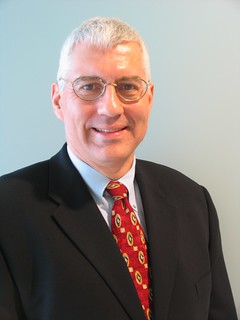 The Burnett Anderson Memorial Award for Excellence in Numismatic Writing is presented annually to a researcher, author or journalist in recognition of their body of work and career contributions to numismatics. First conferred posthumously on its namesake in 1999 at the ANA's 108th Anniversary Convention, the award is intended to celebrate quality and integrity in numismatic wordsmithing of every kind. The recipient is selected in a cooperative process by the ANA, the American Numismatic Society and the Numismatic Literary Guild.
The Burnett Anderson Memorial Award for Excellence in Numismatic Writing is presented annually to a researcher, author or journalist in recognition of their body of work and career contributions to numismatics. First conferred posthumously on its namesake in 1999 at the ANA's 108th Anniversary Convention, the award is intended to celebrate quality and integrity in numismatic wordsmithing of every kind. The recipient is selected in a cooperative process by the ANA, the American Numismatic Society and the Numismatic Literary Guild.
This year's recipient is Joel J. Orosz, a prolific researcher and writer who has been working in the field for four decades. Burnett Anderson's son Mark Anderson accepted the award on Orosz's behalf at the Awards Banquet held August 13 at the World's Fair of ® Money. Orosz found a vocation in philanthropy and an avocation in numismatics. These interests brought balance to his life, for, as he puts it, he dedicated his workdays to giving away large sums of money and spent his leisure hours trying to claw a little bit of it back. Over the years, he has focused on tracing the literary byways of early American numismatics and also on gathering association copies (books inscribed by their authors and notable previous owners).
WAYNE'S NUMISMATIC DIARY: SEPTEMBER 19, 2021
Here are a couple new and old items I've come across in my numismatic travels recently.
Two-Faced Lincoln Cent Artwork
In August our middle son turned 21 and after a nice dinner with friends and neighbors the menfolk took him up to Maryland for an overnight excursion to the MGM Grand National Harbor casino. An artwork hung in one suite at the Gaylord National Resort hotel was made with Lincoln cents.
GEOFFREY BELL 2021 FALL SALE HIGHLIGHTS
Here's a press release with some highlights of the October 1, 2021 Geoffrey Bell Auctions sale at the Toronto Coin Expo. -Editor
Toronto Coin Expo 2021 Fall Sale from Geoffrey Bell Auctions
Geoffrey Bell Auctions Ltd. is proud to present a full lineup of rare and scarce banknotes, coins, tokens, and medals with this year's Toronto Coin Expo Fall Sale. The Toronto Coin Expo , unable to hold an in-person show this year due to the pandemic, is upping their game with the auction portion of the event. Presented over its usual two nights, the Fall Sale sees the Expo team up with two auction partners to present an unprecedented lineup of numismatic material. Keep reading for highlights from Geoffrey Bell Auctions' portion October 1st, 2021.
HIGHLIGHTS OF THE AXEL TESMER COLLECTION
The Künker firm's fall auction sale includes Part 2 of the Axel Tesmer Collection. Here's a selection of highlights that caught my eye in their September 17, 2021 email newsletter. -Editor
In March, we were pleased to offer you the first part of the Axel Tesmer Collection with coins and medals from Brandenburg-Prussia. Now the second part will be auctioned off. It covers the period from the coronation of Frederick I as King of Prussia to the end of the monarchy.
It is impressive to see how meticulously Axel Tesmer collected objects that document every detail of Prussian monetary history. He did not only appreciate great rarities, he paid special attention to fractional coins which are much more difficult to find when looking for pieces of attractive quality. Roland Trampe describes the collector as follows:
In line with his thorough, structured and disciplined manner, Axel Tesmer developed an inventory code and a corresponding cataloguing system for every coin, regardless of whether it was worth 5 DM or more than 10 DM. He did this with great care and attentiveness, and his children sometimes had the feeling that their father's profession was being a coin collector.
A wonderful idea: coin collecting as a full-time job! But isn't it rather the case that collecting coins is a true vocation, enabling a collector to find fulfilment?
KüNKER OFFERS 1870 JAPAN 20 YEN
Künker is also offering a very rare and important Japanese coin in its upcoming sale. -Editor
A New Currency for a New Japan
On 27 September 2021, an icon of Japanese coinage will be auctioned off as part of the Schwarz Collection offered by Künker: the 20 yen piece of 1870 of which only very few specimens were minted to be given to dignitaries of the imperial court. We tell its story.
The fast industrialization of Japan, which started in the years after 1868, did already amaze and impress those who witnessed it at the time. While other Far Eastern countries of the 19th century became more and more dependent on western countries, Japan managed to stay independent while making use of European technology and know-how. The foundations for this development were laid during the Boshin civil war.
NUMISMATIC NUGGETS: SEPTEMBER 19, 2021
Here's a selection of interesting or unusual items I came across in the marketplace this week. Tell us what you think of some of these. -Editor
Faustina Jr. (Wife of Marcus Aurelius) AV Aureus, Rome AD 148-150, 7.20g. FAVSTINA AVG PII AVG FIL, draped bust of Faustina right. Rev. CONCORDIA, dove right. (RIC 503; Calico 2045 (same dies)). Strong strike. Extremely Fine.
Looking for a gift for that special coin collector? Give 'em the bird! From Baldwin's October 2021 sale. -Editor
To read the complete lot description, see:
Faustina Jr. (Wife of Marcus Aurelius) AV Aureus
(https://auctions.baldwin.co.uk/103-lot-25-c212011420)
Other topics this week include a skull and crossbones token, and the United Slaves of America. -Editor
1967 AUSTRALIA PATTERN DOLLAR
We discussed the 1967 Australia pattern dollar in 2020 when one appeared in the Stephen Album Auction 37. Stack's Bowers Auction Services Associate Nicholas Fritz published a blog article about about an example coming up in their Hong Kong sale. -Editor
In our Fall 2021 Hong Kong auction, we have many interesting numismatic offerings, including a 1967 Australia so-called pattern dollar. On Valentine's Day 1966, Australia officially decimalized and converted to the Australian dollar, transitioning from the traditional 240 pence for one Pound system that had been introduced by the British when the Australian Pound was created in 1910. Australian numismatists were disappointed by the exclusion of a one-dollar coin from Australia's new decimal coinage, eschewed for a paper bill. To remedy this, John Gartner, founder of the Australian Coin Review, sponsored a design competition for a pattern dollar. The winning dollar was designed by Andor Meszaros and submitted to the government for review. Rebuffed by the government, Gartner decided to take matters into his own hands and commission the minting of a private pattern dollar.
ROYAL MINT RESUMES PENNY PRODUCTION
David Pickup passed along two articles about the resumption of penny production at the Royal Mint. Thanks. -Editor
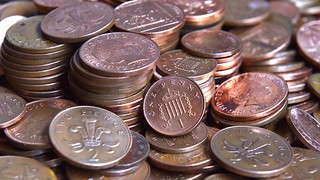 One penny coins were back in production last year after none were minted for general circulation in the previous two years, Royal Mint figures show.
One penny coins were back in production last year after none were minted for general circulation in the previous two years, Royal Mint figures show.
Covid lockdowns meant that many coins were hoarded at home requiring some to be produced for use in the economy.
Banks recently called on people to donate unused loose change to charities after the pandemic hit fundraising.
CHITTY BANG BANG MEDAL
This Baldwin's blog article discusses a medal belonging to Count Zboroswki, inspiration for the book and movie Chitty Chitty Bang Bang. -Editor
A pioneer of motor racing in the early 20th Century, Louis Vorow Zboroswki was the son of a wealthy American aristocrat. A colourful figure, he would go on to design and build his own racing cars, the first of which was named ‘Chitty Bang Bang'. Throughout his career, he participated in many motor races across the world, as well as the legendary Indianapolis 500 in 1923.
US COLONIAL PAPER MONEY: AN INTRODUCTION
In his World Banknote Auctions blog, Dennis Hengeveld published an overview of U.S. colonial paper money. -Editor
US Colonial Paper Money: An Introduction
In 1690 the Colony of Massachusetts issued what would be the first paper currency introduced in North America. While Paper Money had been first printed in China hundreds of years earlier, what we now know as Colonial US Paper Money was the first large issuance of banknotes in the western world. The thirteen original colonies which would later form the United States of America all issued paper money, and many of these notes are surprisingly affordable. In this article we will give some collecting ideas of these fascinating pieces. Thanks to the relative affordability of these notes they are within reach of many collectors. While generally collected within the scope of US Paper Money world collectors will find such issues interesting as well, as many were issued under British rule and as a result they will easily fit in an advanced world collection as well.
One of Each of the Original Thirteen Colonies
A basic collection that many collectors attempt to assemble is a single note from each of the original thirteen colonies: Delaware, Pennsylvania, New Jersey, Georgia, Connecticut, Massachusetts, Maryland, South Carolina, New Hampshire, Virginia, New York, North Carolina and Rhode Island. A collection such as this is relatively easily assembled, although it can become more challenging by only seeking out those issued prior to the Declaration of Independence. Additionally, many collectors include Vermont (the 14th State) in such a collection, although this makes completion very difficult, as Vermont issued just a single series (dated February 1781) of which just 3,600 pieces of each denomination were printed. Most Vermont pieces are repaired or otherwise impaired, and finding high quality examples is extremely difficult.
NEW ZEALAND FEMINIST KATE SHEPPARD
This article discusses women's suffrage leader Kate Sheppard, who appears on a $10 New Zealand banknote. -Editor
In 1992 four New Zealand icons (and the queen) appeared on new banknotes. Part of creating national identity, these notable citizens were chosen to represent the pinnacles of achievement.
Apirana Ngata, Edmund Hillary, Ernest Rutherford and Kate Sheppard — all in circulation so their acts and values can be admired, celebrated and emulated.
Collectively, the banknote icons signalled a bicultural nation that celebrates Maori knowledge and success, a place where women are equal and where it is possible to lead the world, including in science and exploration.
BOGGS, TUBMAN AND U.S. PAPER MONEY
Together with Robert Cavalier of Carnegie Mellon University, I recently wrote an article for CoinWeek about the Harriet Tubman note produced by our mutual friend J.S.G. Boggs. Here's an excerpt; be sure to see the complete article online. -Editor
The proposed Harriet Tubman $20 bill would not be the first time the famed abolitionist and women's suffragist
appeared' on a United States banknote. The fascinating tale begins in the early 1990s, when the
Money Artist
J.S.G. Boggs came to Pittsburgh, invited by Carnegie Mellon's Center for the Advancement of Applied Ethics (CAAE).
He spent the first month or so at the home of Robert Cavalier, a member of CAAE specializing in interactive multimedia. While there, he made a number of phone calls to England costing about $90. Boggs reimbursed Cavalier with a newly drawn $100 bill featuring a young Harriet Tubman. Therein lies a tale – one involving artists, historians, philosophers, and numismatists along with the US Treasury.
ZIMBABWE ARTIST TURNS NOTES INTO PAINTINGS
An artist in Zimbabwe is repurposing old banknotes. -Editor
If anyone doesn't need reminding that banknotes are just worthless pieces of paper, it is Zimbabweans: more than a decade ago, they watched as hyperinflation obliterated their currency and led to the printing of a 100 trillion Zimbabwean dollar note.
Zim dollars were abandoned in 2009, after inflation caused by rampant money printing under the late President Robert Mugabe erased everyone's savings and pushed millions into poverty.
Most bills ended up in the trash, but Zimbabwean visual artist Prudence Chimutuwah has found value in the unloved old bank notes - by using them to make art.
THE BOOK BAZARRE
WHEN THE WILD BUNCH FIRST GRABBED GOLD
Butch Cassidy and the Sundance Kid stole their first sack of gold coins in this day in 1900. Here's a piece from today's Writer's Almanac. -Editor
 On this day in 1900 Butch Cassidy and the Sundance Kid committed their first robbery together taking $32,640 from the First National Bank of Winnemucca, Nevada. They were a part of the "Wild Bunch Gang," a group of ruffians and robbers who committed the longest string of successful bank robberies in American history. Most of the Winnemucca loot was in gold coin. Witnesses said the robbers wore masks. It was a midday robbery and quite daring, though the escape left something to be desired: as the robbers fled, they dropped a sack of gold by a creek and had to go back and retrieve it. They had fresh horses waiting, though, and soon were on their way. The citizens of Winnemucca organized a posse and even used a yard locomotive to pursue the robbers.
On this day in 1900 Butch Cassidy and the Sundance Kid committed their first robbery together taking $32,640 from the First National Bank of Winnemucca, Nevada. They were a part of the "Wild Bunch Gang," a group of ruffians and robbers who committed the longest string of successful bank robberies in American history. Most of the Winnemucca loot was in gold coin. Witnesses said the robbers wore masks. It was a midday robbery and quite daring, though the escape left something to be desired: as the robbers fled, they dropped a sack of gold by a creek and had to go back and retrieve it. They had fresh horses waiting, though, and soon were on their way. The citizens of Winnemucca organized a posse and even used a yard locomotive to pursue the robbers.
The money was never recovered and, in fact, no one really knew for sure if Butch Cassidy was even there; some said he was actually in Tipton, Wyoming, planning another robbery during the Winnemucca escapade. The American Bankers Association even brought in the famed Pinkerton Detective Agency, but they never discovered the robbers' identities either.

